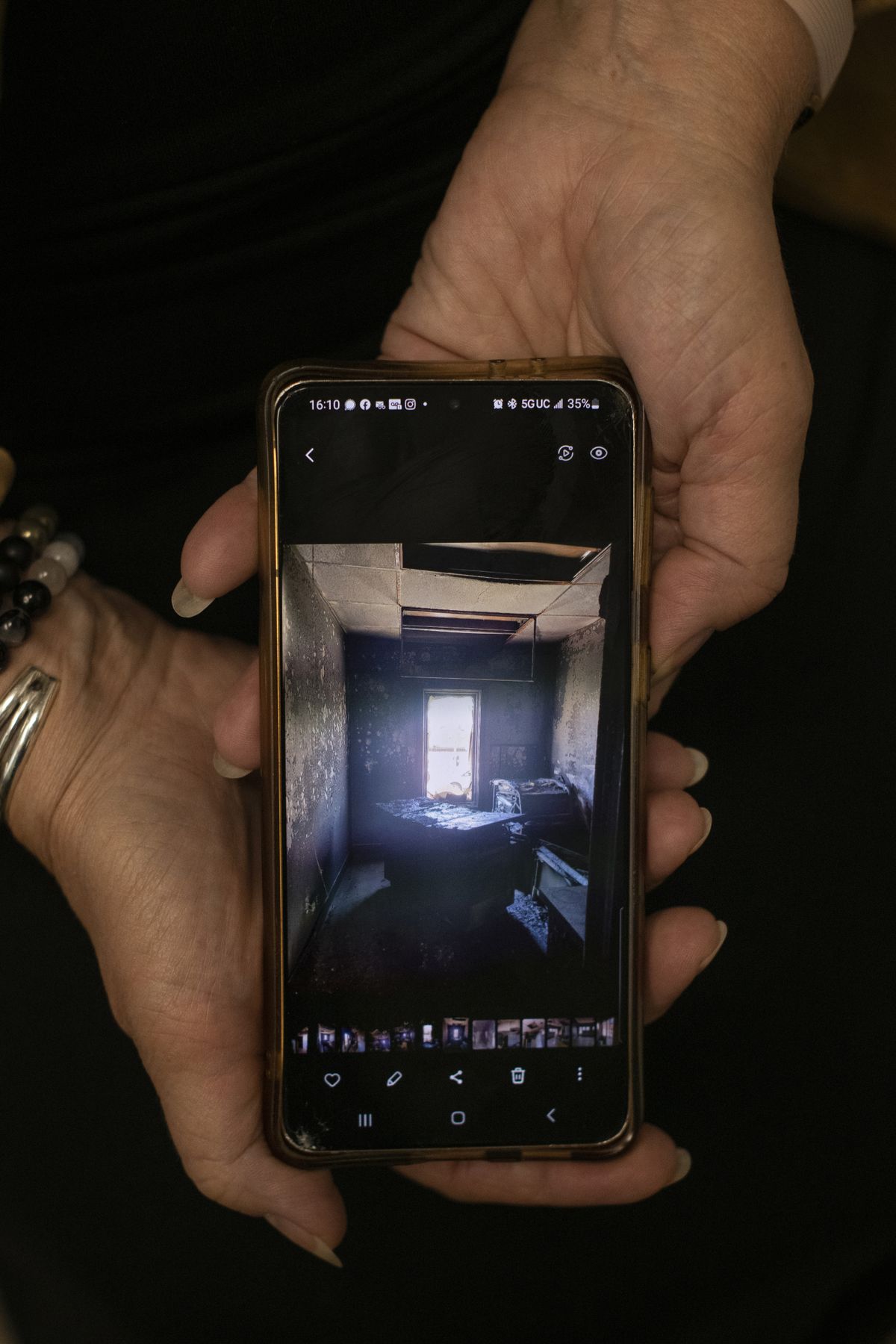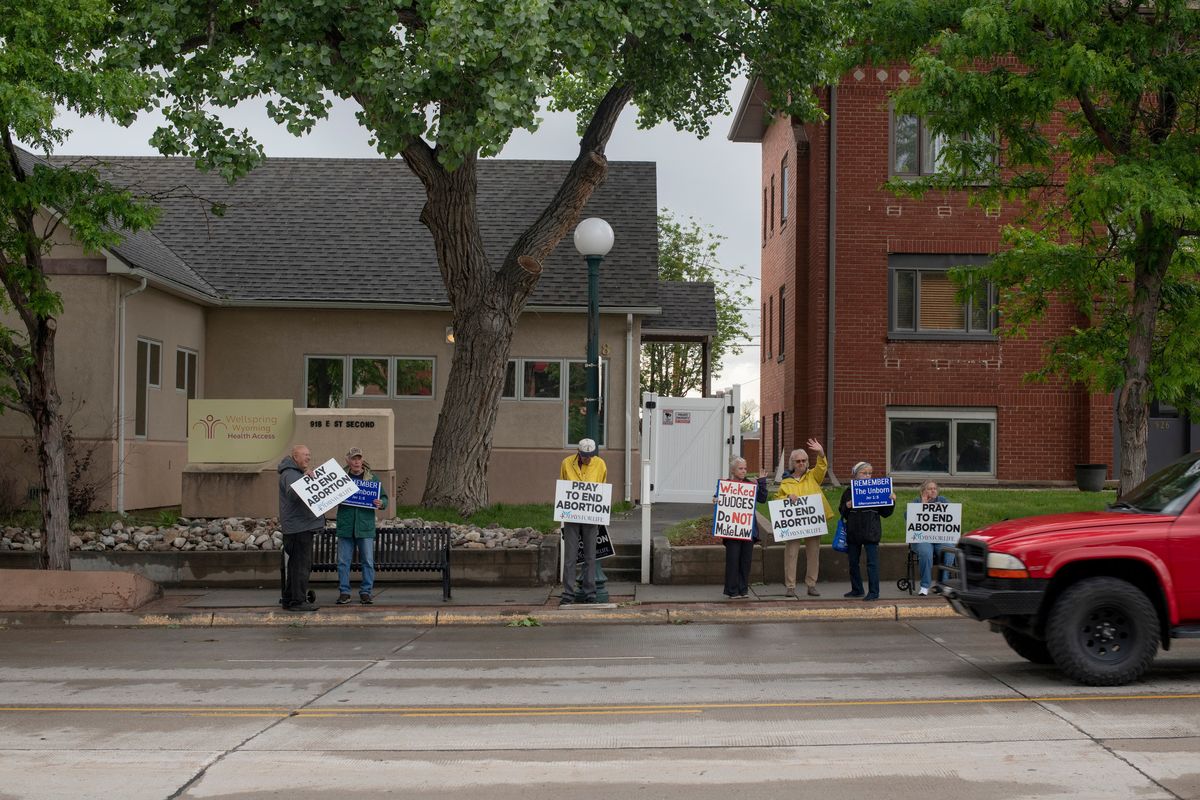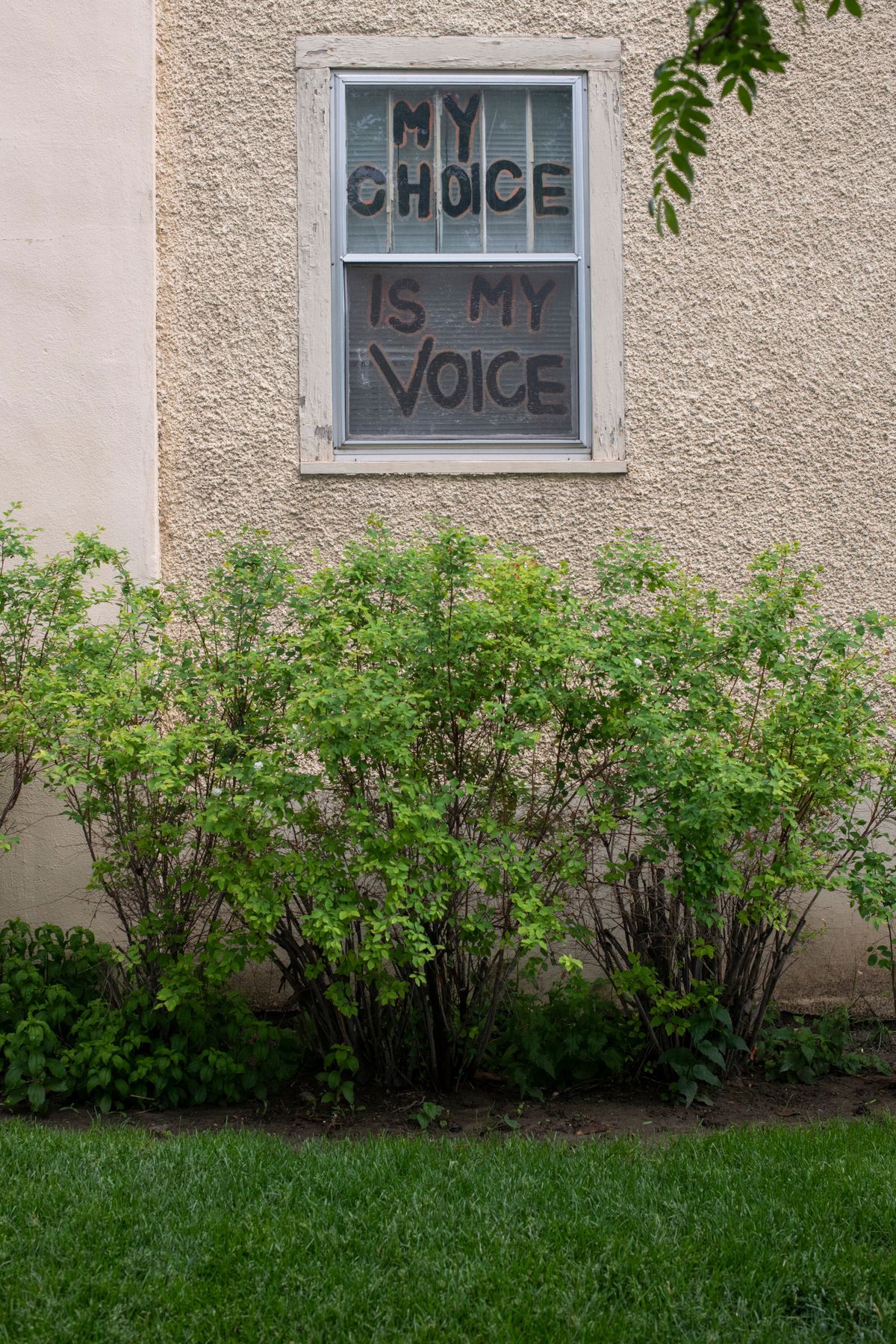America’s unlikeliest abortion clinic has opened in its reddest state
Abortion opponents protest in front of the new Wellspring Health Access clinic in Casper, Wyo., the only facility in the state that provides surgical abortions. MUST CREDIT: Photo for The Washington Post by Rachel Woolf (Rachel Woolf/For The Washington Post)
CASPER, Wyo. – The new Wellspring Health Access clinic is unremarkable inside: Walls painted in soft hues, Ms. magazines in the waiting room, cabinets filled with medical supplies.
But the story behind those white cabinets is anything but ordinary. The original ones were destroyed in May 2022, when an arsonist torched the facility shortly before it was to begin seeing patients. The damage set back Wellspring’s opening by a year – and sent an unmistakable message about the hostile terrain outside what may be the unlikeliest abortion clinic in the country.
Since news of the Supreme Court’s pending reversal of Roe v. Wade leaked last spring, followed weeks later by the justices’ ruling, abortion in conservative states has been marked by retrenchment. Dozens of facilities stopped providing abortions, closed or moved to friendlier states because of bans or anticipated bans. Just one new clinic opened in a state targeting the procedure, according to research by professor Caitlin Myers of Middlebury College. That was Wellspring, which finally began offering surgical and medication abortions in late April.
Most of Wyoming is an abortion desert, and most lawmakers in America’s reddest state – having passed laws restricting nearly all abortions as well as the nation’s first explicit prohibition on abortion pills – want to finish the job. Many residents support their effort: Authorities say the 22-year-old woman accused of setting fire to Wellspring told them she opposed abortion. Casper’s mayor said he believes abortion providers will go to hell.
Yet with the state’s restrictions tied up in court, Wellspring’s small stucco building represents a dramatic abortion standoff and a stark expansion of abortion services in a region of wide-open range and sky.
Wyoming’s only other provider, 280 miles away in Jackson, offers just abortion pills. Wellspring’s four physicians have seen patients from South Dakota, Utah and Nebraska, neighboring states with limited or no abortion services. The clinic serves a dozen patients a week on average. Nearly half receive abortions, the rest reproductive health care.
“You can have these events happening outside the clinic, but inside they don’t disturb our ability to see patients,” clinic founder Julie Burkhart said on a recent evening as a young woman from South Dakota, the last of the day’s patients, checked out at the reception desk.
On the rain-drenched sidewalk out front, about 10 protesters waved signs at passing cars. They said they were praying for the unborn – and for Wyoming’s bans to prevail.
“I was surprised that this opened in Casper, because most people here, the vast majority, are pro-life,” said Jeanette Ward, who moved to Wyoming from what she calls “fascist Illinois” and serves as a Republican state representative.
Burkhart is no stranger to hostility. She was the spokesperson for the Kansas clinic run by physician George Tiller when he was fatally shot at his church by an antiabortion extremist in 2009. Burkhart said his murder made her briefly consider abandoning the work. Instead, she steeled her resolve to expand services in abortion deserts, reestablishing Tiller’s facility and later opening one in Oklahoma City. She also owns clinics in Illinois and Washington state.
She has encountered plenty of harassment and threats, but Casper was the first arson. “For me, it’s not just about Casper. It’s not just about Wyoming,” said Burkhart, who lives in Colorado but maintains close contact with the staff here and travels to Wyoming regularly. “It’s how do we continue to work to provide access to people where we can now, and how can we increase that access?”
Wellspring’s ability to operate is rooted in the hands-off brand of conservatism that characterized Wyoming politics before hard-liners began gaining influence. In 2011, lawmakers worried about the Affordable Care Act potentially mandating enrollment in an “Obamacare” plan approved a resolution that put a constitutional amendment to a public vote. It passed, giving adults the right to make their own health-care decisions.
That amendment now underpins legal challenges to the state’s bans by Wellspring and four co-plaintiffs – the Jackson abortion provider, a Wyoming nonprofit that helps to facilitate abortions and two Wyoming women. In court filings, the state has said its policy “is and has always been to criminalize abortion” and argues that abortion is not health care.
Bob Brechtel is a former Republican state lawmaker who co-sponsored the 2011 resolution that led to the amendment. “That was never the intention of it,” said Brechtel, who was demonstrating outside the clinic last week. “Abortion is not health care. It’s the killing of innocent life.”
In March, a state judge in Jackson issued a temporary restraining order on the ban, which makes most abortions a felony punishable by as much as five years in prison. Later this month, she is scheduled to consider a similar order for the medication abortion ban just before it is slated to take effect.
Burkhart began contemplating a local clinic at the behest of Christine Lichtenfels, a Wyomingite who heads Chelsea’s Fund, the organization involved in the court case. While the state allowed abortion up to viability with few restrictions, she explained, women often had to travel hundreds of miles for the procedure. In winter, snow-covered roads sometimes made that almost impossible.
“I’d been trying to inspire some other people to come to Wyoming,” said Lichtenfels, who lives 150 miles west of Casper in Lander. “The idea that [surgical] abortion is now available in Casper, it’s huge.”
The two settled on this city of 60,000 for its central location on Interstate 25, reliable airport and medical center. Using donor funding, Burkhart found a property that had previously housed a medical clinic and hired contractors to begin renovation. None wanted to display a sign outside.
The crews replaced the floors and repainted the walls, saving the sturdy oak cabinets for the new clinic’s use. They built an addition for a recovery room, where patients would rest in recliners after their abortions.
The protests began as the clinic neared its original opening date last spring. Then, around dawn on May 25, 2022, Burkhart got a call from one of the contractors. The building was on fire.
Security camera footage showed a woman in a hoodie breaking a window to enter, then pouring gasoline on the reception desk and floor. Lorna Green of Casper was arrested and charged with arson in March. She was indicted by a federal grand jury in May and has pleaded not guilty. A trial is set for July 24.
The blaze did $300,000 in damage, according to Burkhart. The clinic had to be stripped down to the studs and rebuilt over the next year.
The all-female staff was traumatized, Burkhart said. But no one quit.
Brittany Brown, a registered nurse, had eagerly applied for a job after reading an article about the clinic coming to Casper. After the leak of the Supreme Court’s abortion decision, she decided she had to respond. “I find our work to be important and sacred on some level,” she said. “Women have been taking care of each other for generations.”
The nonpartisan city council has mostly avoided debate over the clinic, though it has been a flash point. When the Oil City News posted an article about Wellspring’s April 20 opening on Facebook, Mayor Bruce Knell responded with an image of a fire. At a public meeting days later, he tearfully apologized for a comment he said was in “poor taste” and not meant to endorse arson, as several outraged residents charged. Two other council members defended the clinic.
Knell, who describes himself as a “literal Bibleist,” said in an interview that he had found the image by Googling “dancing in fire” on his cellphone – “because that’s what they’re going to be doing, in my opinion.” Even so, he’s not heeding calls for a city resolution condemning abortion.
“They are a legal, law-abiding business, so they have a right to be here,” he said. “We will allow this to play out in the courts. And I do think the pro-life folks will see a result that they’re happy with.”
As the clinic closed for the day last week, Brown finished up patient records on her laptop. She said she is not worried about the possibility of prosecution, despite threats by some antiabortion states against out-of-state providers. Some of her colleagues are concerned about retribution in the community, however. They stay quiet about their workplace. The physicians, who rotate in from outside of Wyoming, also keep a low profile.
“If someone wanted to get real salty about what I’m doing, I have a nursing license on the line,” Brown said. “I’m always making sure to mind my p’s and q’s.”
Legal repercussions are at times a topic of discussion with patients. Another South Dakota woman, who had come that same day for abortion medication, had opted instead for a surgical procedure so she would not return home pregnant or with pills, Burkhart said.
“We give the options,” she said. “We don’t want to scare people at all, but we want to be realistic.”




